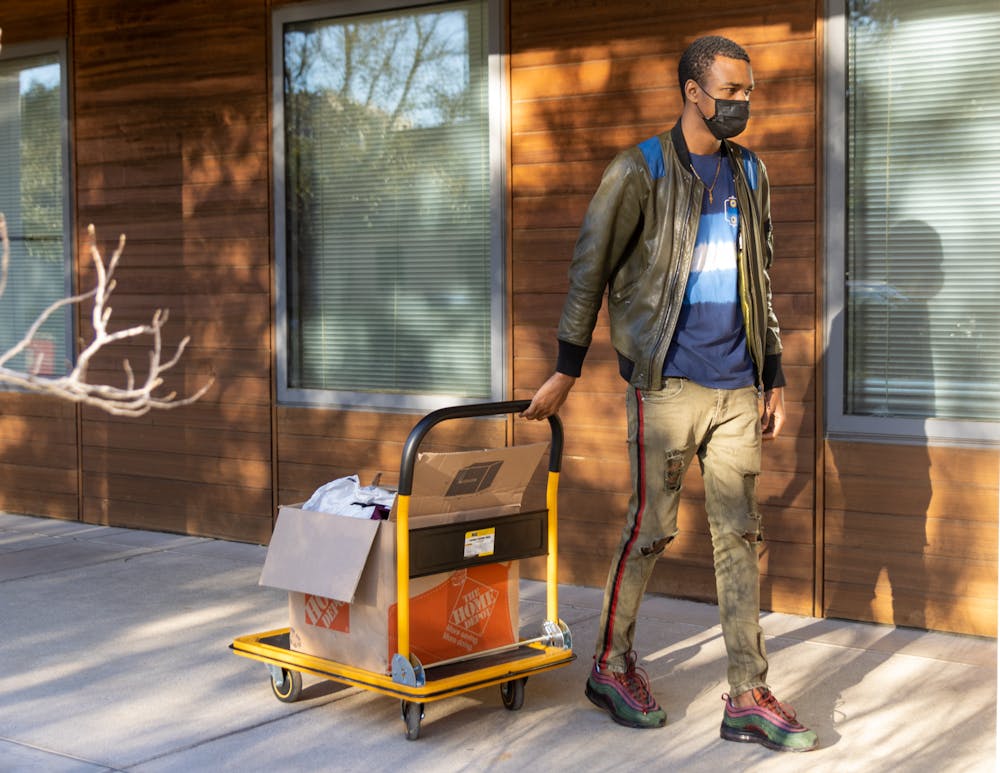Decrease in COVID-19 positivity rates prompts earlier move-in dates and lifting of restrictions

Over the past two weeks, COVID-19 cases on Rice’s campus have been decreasing after a spike in positive tests from late December until the third week of January. In response to this decrease, undergraduates were allowed to move in on campus one week earlier, on Feb. 6 and 7, without needing petitions.
Kevin Kirby, chair of the Rice Crisis Management Advisory Committee, said in a recent email that in-person classroom restrictions and gathering capacity limitations will be eased with classroom capacity being raised to 40 as well as indoor and outdoor group activities of up to 25 and 50 people, respectively, being permitted.
Recently, the greater Houston area has also been experiencing slight decreases in positive tests. According to the Texas Medical Center’s COVID-19 Testing Metrics, the week of Jan. 25 had a weekly average of 3,509 positive tests in contrast to the average of 4,282 during the week of Jan. 11. During the week of Jan. 31 to Feb. 6, campus testing reported nine positive tests, while the two weeks before that had 20 and 38 positive tests respectively.
“What we are seeing now in Houston now is an improving environment, and we are seeing that reflected in our own numbers as well,” Kirby said.
Kirby said that peer institutions have also observed similar trends in positive tests with a spike over winter break, and decrease over recent weeks. For example, Princeton University reported only one positive case the week of Feb. 5 — a marked decrease compared to the 27 and 17 positive tests from the two weeks before then. Kirby said he remains optimistic and confident that cases will continue to decrease on campus over the next couple of weeks.
In an email on Jan. 31, Dean of Undergraduates Bridget Gorman said that due to recent improvement in the COVID-19 situation in Houston, students will be allowed to move in on the weekend of Feb. 6 and 7 in addition to the original date on Feb. 13 and 14.
“We are just trying to space out the arrivals on campus, to make it a smoother process in an effort to accommodate all students’ plans given the improved safety on campus with recent case decreases,” Kirby said.
Charan Santhirasegaran, a sophomore at McMurtry College, said that he was excited that Rice allowed students to move in a week earlier than anticipated.
“It was definitely great news when I found out that we could move in a week earlier. I could not wait to meet my friends and be back on campus after this year’s particularly long winter break,” Santhirasegaran said.
Kirby said he maintains a positive outlook on the upcoming semester regarding the COVID-19 situation both on and off campus. He said that while there have been over 280 positive tests since the start of testing in August, only 10 originated from on-campus transmission. This is largely due to the student body’s dedicated adherence to the Rice Culture of Care Agreement, as well as protocols and best practices recommended by the Centers for Disease Control and Prevention, according to Kirby.
Marc Shen, a sophomore from Hanszen College, said that it was important to abide by COVID restrictions and protocols on campus.
“While it is not the ideal college experience any of us want, following the regulations that Rice has requested us to follow is the best way to ensure our wellbeing during this unprecedented time,” Shen said.
Although there have been no updates from the state regarding vaccinations yet, Kirby said he remains hopeful that sometime over the following month, Rice will gain access to their requested allotment.
“We know that it is hard for our students to maintain unconventional practices such as social distancing and mask-wearing over a long period of time, but it is more important than ever that we ask them to do so over the following months before vaccinations are distributed,” Kirby said. “It is only through collective effort that we can improve our fight against this pandemic, and accelerate the return to normalcy.”
More from The Rice Thresher
Rice welcomes 7.8% of applicants to class of 2029
Rice accepted 2,852 applicants to the class of 2029 March 26, said Yvonne Romero, vice president for enrollment. This represents 7.8% of 36,777, the highest acceptance rate since 2022.

Neurologist Huda Zoghbi announced as commencement speaker
Huda Zoghbi was announced to be the speaker for Rice’s 122th commencement, March 26. Zoghbi is a professor of molecular and human genetics at Baylor College of Medicine.

Out with the old, in with the new
Rice Athletics fired baseball head coach José Cruz Jr. on March 13, less than a month into the season. The baseball team was 2-14 and on a 10 game losing streak at the time of his firing. Just days later, Rice welcomed baseball veteran David Pierce to fill Cruz’s seat.


Please note All comments are eligible for publication by The Rice Thresher.